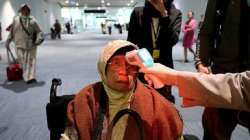Coronavirus outbreak: How fear has gripped the world
A novel coronavirus (nCoV) is a new strain that has not been previously identified in humans. Coronaviruses are zoonotic, meaning they are transmitted between animals and people.

The China office of the World Health Organisation (WHO) was informed regarding cases of pneumonia of unknown etiology or unknown cause, detected in Wuhan City, Hubei Province of China in December 2019. Since then the novel Coronavirus has set alarm bells ringing for health community across the globe. By January 3, 44 patients with pneumonia of unknown etiology had been reported to WHO by national authorities in China. Out of those 44 cases, 11 were severely ill. The count was raised up to 1,287 cases and 41 deaths in 29 provinces of China, including district and cities.
According to WHO "Coronaviruses (CoV) are a large family of viruses that cause illness ranging from common cold to more severe diseases such as Middle East Respiratory Syndrome (MERS-CoV) and Severe Acute Respiratory Syndrome (SARSCoV).
A novel coronavirus (nCoV) is a new strain that has not been previously identified in humans. Coronaviruses are zoonotic, meaning they are transmitted between animals and people. Detailed investigations found that SARS-CoV was transmitted from civet cats to humans and MERS-CoV from dromedary camels to humans. Several known coronaviruses are circulating in animals that have not yet infected humans.
The virus, causing an outbreak in China, was identified as a novel Coronavirus.
Since then, Wuhan city of China made headlines in the media reports on a daily basis for being the epicentre of the outbreak of deadly virus.
According to media reports, the popular market in Wuhan was closed on January 1 for environmental sanitation and disinfection.
The virus was rapidly transmitted to other parts of the globe as 28 cases were confirmed outside China mainland, including countries like the United States, Vietnam, South Korea and Hong Kong. One case was also reported in Nepal. The chances of spreading the virus were estimated high due to Chinese new year celebration.
Given the fact that people from India frequently travelled to and fro China and the deadly virus had reached to close neighbourhood Nepal, the Ministry of Health and Family Welfare also came into action and issued travel advisories and guidelines for screening suspected cases at 19 important international airports including Delhi, Mumbai, Chennai and Hyderabad. More than 9,000 patients were screened at the airport.
The matter caused even more worry when 25 medical students were reportedly stuck in China due to shutdown of flights operating from Wuhan. All of them were safe, according to the Health Ministry.
The All India Institute of Medical Sciences said it had set up an isolation centre for suspected nCoV patients. The disease caused panic because it was a novel virus to which humans were never exposed, therefore, no vaccine was available to cure it.
The National institute of virology in Pune geared up for sample tests. It recently tested four samples of suspected patients, but all showed negative. However, the ministry continued its efforts to stop the virus from transmitting in India by working closely with the Ministry of Civil Aviation and Ministry of External Affairs and issuing guidelines and advisories on a regular basis.
Health Minister Harshvardhan reviewed preparedness regarding nCoV with senior officers of ministry, Indian Council of Medical Research (ICMR) and National Cooperative Development Corporation (NCDC) and decided that seven teams would visit states & designated airports. The NCDC Call Centre was made operational.
According to media reports, China rushed to build a new hospital in just ten days to treat the patients of the killer virus. China had set up a national research team of 14 experts to help prevent and control the disease.
Due to the fear that the spread of the deadly coronavirus in China will undercut demand for crude, Brent crude rates dropped sharply and became cheaper by at least 7 per cent in a week, the biggest drop since December 2018.
Fears that the outbreak of coronavirus in China might disrupt economic activities and global growth sent the stock markets tumbling. Wall Street's three main stock indexes closed lower amid investors' concerns over the new outbreak in the US.
Hong Kong declared the impact of the novel Coronavirus outbreak to be the highest emergency response level, raising it from the previous status of "serious" after the city reported five confirmed cases.
The Chinese authorities sent 450 military medics in an effort to fight the outbreak in the hardest-hit city of Wuhan.
The major event of Asian/Oceanian Tokyo 2020 boxing qualifying event, was cancelled in China due to the outbreak. It was later rescheduled in Jordan.
The medical community across the globe continues to engage in researching medicine and vaccine to battle the deadly virus that brought the world on its knees within a month.
Also Read: Coronavirus: Travelling to China? Govt issues travel advisory you must follow